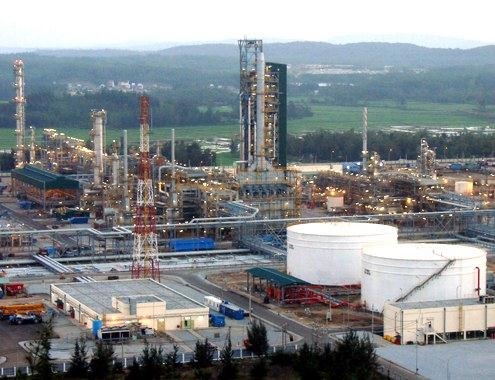 Economy
Economy

The long-awaited multi-billion US dollar refinery project is facing an uncertain future after nearly three years of registration for investment.
 |
| The Nhơn Hội oil refinery and petrochemical complex will use 660,000 barrels of crude oil per day, equivalent to 30 million tonnes per year. — Photo vietstock.vn |
Viet Nam News -HÀ NỘI — The long-awaited multi-billion US dollar refinery project is facing an uncertain future after nearly three years of registration for investment.
In 2009, the project of PTT Public Company Limited (Thailand) had attracted public attention right from its initial days. Under the original plan, this giant project was to be licensed in June 2015, but that has not happened yet.
The undertaking was initially estimated to cost $28.7 billion but was revised down to nearly $22 billion in the feasibility study. Thai oil and gas company PTT had partnered with Saudi Aramco for a proposed $22bn refinery and petrochemical complex in Việt Nam.
The Nhơn Hội oil refinery and petrochemical complex will use 660,000 barrels of crude oil per day, equivalent to 30 million tonnes per year.
The project will be located in the Nhơn Hội Economic Zone in Bình Định Province, designed to be Việt Nam’s first petrochemical refinery complex. The provincial government is preparing 2,000 hectares of land to make room for construction of the oil refinery and petrochemical complex, which is to be developed in two phases.
Work on the project is expected to commence in early 2017 with plans to commission the complex in 2022.
Chairman of Binh Định People’s Committee Hồ Quốc Dũng was quoted by Người Lao Động newspaper as saying that the PTT (Thailand) and its partner Saudi Aramco sent their new plan to change the project scale and lower planned capacity and reschedule project construction.
After numerous adjustments, in September 2014, the Bình Định People’s Committee, PTT and Saudi Aramco submitted a specific report on the project to the Ministry of Industry and Trade for appraisal and submitted it to the government for approval.
In 2014, the Government gave the nod for implementation of the oil refinery complex and agreed to add it to the master plan for development of the oil and gas industry in Việt Nam.
Reason for slow progress
Nguyễn Ngọc Toàn, deputy director of the Nhơn Hội Economic Zone attributed the slow progress to the global oil prices which are continuing to fall. Until now, the investor has not applied for an investment licence. Thailand’s PTT Plc and Saudi Arabia’s Aramco would inform local authority of their decision this June, he added.
Chairman of Bình Định People’s Committee Hồ Quốc Dũng said that in the near future the province would work with PTT to confirm the project, and if the investor really wanted to continue. The province would also work with relevant ministries to consider more incentives for the investor amidst the current difficult economic situation.
In case the investor did not wish to continue the project, the province would offer the land to other investors who wanted to use this land fund for industry and tourism purposes, according to the Provincial Department of Planning and Investment.
According to Hồ Sỹ Thoảng, former chairman of PetroVietnam the oil refinery industry was now facing a hard time. An oil refinery needed at least 20 years for investment capital depreciation. Currently, profit for the global oil refinery industry was very low at around 5 per cent to 6 per cent. Only a completed project can survive. Projects such as the Nhơn Hội oil refinery were not feasible due to very low profits. According to Thoảng, the development of the project should be reconsidered.
Đặng Đình Đào former head of Economic Research and Development Institute said that amid the difficult situation with regard to global oil prices, investors reconsidered and restructured their project. That was understandable as oil prices would have a major effect on their project. The global oil crash had also affected several oil refineries. In Việt Nam, the government should be cautious in developing oil refineries as their finished products cannot compete and it was unreasonable. — VNS




